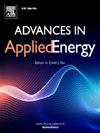Adaptive reinforcement learning for energy management – A progressive approach to boost climate resilience and energy flexibility
IF 13.8
Q1 ENERGY & FUELS
引用次数: 0
Abstract
Energy management in urban areas is challenging due to diverse energy users, dynamics environmental conditions, and the added complexity and instability of extreme weather events. We incorporate adaptive reinforcement learning (ARL) into energy management (EM) and introduce a novel approach, called ARLEM. An online, value-based, model-free ARL engine is designed that updates its policy periodically and partially by replacing less favorable actions with those better adapted to evolving environmental conditions. Multiple policy update mechanisms are assessed, varying based on the frequency and length of updates and the action selection criteria. ARLEM is tested to control the energy performance of typical urban blocks in Madrid and Stockholm considering 17 future climate scenarios for 2040–2069. Each block contains 24 buildings of different types and ages. In Madrid, ARLEM is tested for a summer with two heatwaves and in Stockholm for a winter with two cold waves. Three performance indicators are defined to evaluate the effectiveness and resilience of different control approaches during extreme weather events. ARLEM demonstrates an ability to increase climate resilience in the studied blocks by increasing energy flexibility in the network and reducing both average and peak energy demands while affecting indoor thermal comfort marginally. Since the approach does not require any information about the system dynamics, it is easy to cope with the complexities of building systems and technologies, making it an affordable technology to control large urban areas with diverse types of buildings.
用于能源管理的自适应强化学习——一种提高气候适应能力和能源灵活性的渐进方法
由于能源用户的多样性、动态环境条件以及极端天气事件的复杂性和不稳定性,城市地区的能源管理具有挑战性。我们将自适应强化学习(ARL)整合到能量管理(EM)中,并引入了一种称为ARLEM的新方法。设计了一个在线的、基于价值的、无模型的ARL引擎,该引擎定期更新其策略,部分地通过将不太有利的操作替换为更适合不断变化的环境条件的操作。评估多个策略更新机制,根据更新的频率和长度以及操作选择标准而变化。ARLEM经过测试,以控制马德里和斯德哥尔摩典型城市街区的能源性能,考虑到2040-2069年的17种未来气候情景。每个街区包含24座不同类型和年龄的建筑。在马德里,ARLEM测试了一个有两次热浪的夏天,在斯德哥尔摩测试了一个有两次寒潮的冬天。定义了三个性能指标来评估极端天气事件中不同控制方法的有效性和弹性。ARLEM通过增加网络中的能源灵活性,降低平均和峰值能源需求,同时略微影响室内热舒适,证明了在所研究的街区中增加气候适应能力的能力。由于该方法不需要任何关于系统动力学的信息,因此很容易处理建筑系统和技术的复杂性,使其成为一种经济实惠的技术,可以控制具有不同类型建筑物的大型城市地区。
本文章由计算机程序翻译,如有差异,请以英文原文为准。
求助全文
约1分钟内获得全文
求助全文

 求助内容:
求助内容: 应助结果提醒方式:
应助结果提醒方式:


